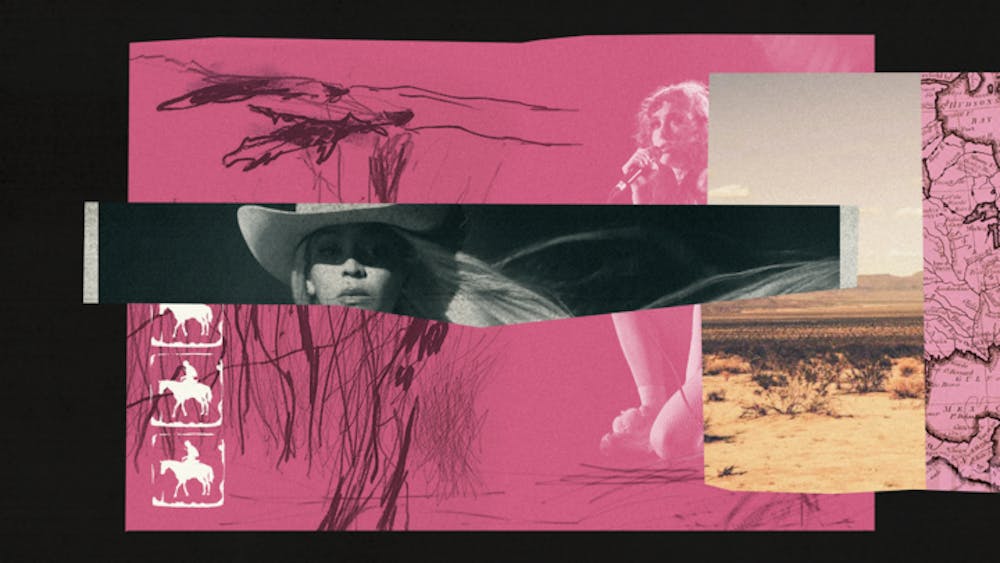On March 13, 2025, indie pop singer Chappell Roan rocked the worlds of sapphic Midwest princesses everywhere by going full Nashville. On that fateful day, Roan released the single “The Giver” from her upcoming album, and to the shock of some (and the chagrin of many), the record is a country song. Roan joins many others in the industry that are undergoing an anti–Taylor Swift arc, if you will: female pop stars shifting their music over to a country aesthetic. Sabrina Carpenter, for example, collaborated with country superstar Dolly Parton on the deluxe version of her album Short n Sweet in February. Beyoncé released her first country album, Cowboy Carter, to much acclaim last year. So what’s going on? Are rhinestone cowboy boots trending of their own accord? Or are there larger political causes and implications behind the insidious move to guitars and Southern twang?
Before answering this question, it is important to note that these artists haven’t just stopped their transformation of their sound. Many, like Beyoncé, have adopted explicitly more Americana aesthetics into their visual media. The album cover of Cowboy Carter, for example, features the singer in red, white, and blue, seated on a horse, a beauty pageant contestant’s badge across her chest. Sometimes these reinventions don't entail Americana directly but they do recall other traditional aesthetics, such as the 1950s housewife vibe underlying Sabrina Carpenter’s newest music video for “Please, Please, Please ft. Dolly Parton.” The music video is shot in black and white and features Carpenter and Parton wearing pearls, headbands, lacy gloves, and button–up dresses. When asked about collaborating with Carpenter, Parton told Knox News that she wouldn’t compromise on the cursing. “Of course, she can talk a little bad now and then,” Parton explained. “I told her, I said, ‘Now, I don’t cuss. I don’t make fun of Jesus. I don’t talk about God and I don’t say dirty words.”
Parton’s comment ties into an important truth about country music, one that may inform artists’ decision (or lack thereof) to dabble in the genre: its ties to religion and conservatism. Many country artists are also Christian artists, and their songs often explicitly reference God and the church (ie. “Bless the Broken Road” by Rascal Flatts, or “God’s Country” by Blake Shelton). Still, others embrace the culture of the Christian South as their inspiration, sometimes offering sweet testaments to the beauty of the South, though simultaneously spreading outdated (and often hateful) rhetoric. Kyle Coulahan, a rising country artist, is one example. Coulahan’s discography includes titles like “Jesus and Trump” and “Still Proud to be An American.” More recently, Coulahan teased the infamous “pronouns song” on Tiktok, on which he sings, “I never understood the whole pronoun thing / or why people think it was okay to push their agenda / ‘til we believe.”
While this kind of rhetoric—direct, blunt, and unforgiving—is rare, it is nevertheless an interesting frame through which to consider the effect of, say, “The Giver.” It is undeniably true that the United States is faced with a resurgence of conservative ideology; look no further than the trending tradwives, Brett Cooper, and the red pill male podcaster epidemic. Artists rely on their large platforms for their livelihood, so if the center is swinging right, wouldn’t it make sense for artists to adjust, too? On the Country Heat Weekly Podcast, Roan defended herself against this claim. “I’m not trying to convince a country crowd that they should listen to my music by baiting them with a country song,” she said. “That’s not what I feel like I’m doing. I just think a lesbian country song is really funny. So, I wrote that.”
On the other hand, the movement of artists like Roan into country spaces could be seen as defiance against the political situation in the United States right now. Chappell Roan, after all, is an LGBTQ+ artist, and “The Giver,” while generically similar to works like “Jesus and Trump” is about a lesbian relationship, a topic traditionally excluded from the country genre. Beyoncé, as a Black, female artist, creates a powerful statement about her experience as an American woman by ‘reclaiming’ the country genre.
But it’s hard to tell if this shift in genre is emblematic of a much larger political transition. Either way, it’s certainly true that artists, like the rest of us, are hyper–aware of the political culture we live in right now. Whether the popularization of country music (and the flight of pop artists into country genres) is an attempt at reclamation or indicative of a regressive movement remains to be seen.

